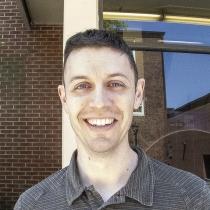
Robert Walters
What is your next adventure?
I plan to remain at Georgia Tech where I will be working as a research engineer at the rotorcraft simulation lab where I've been working for the last two years. As a research engineer I'll continue working on controls with Dr. Prasad and I will also pick up some more perspective in human factors by working with Dr. Feigh. This was my number one choice, after finishing my master's program, because it will allow me to get a Ph.D. As a non-traditional grad student - I have a wife, one child, and another on the way -- I needed some way to support my family while I study. The RE job will allow me to do both, even if I have to study for quals with a newborn baby.
What about your next adventure are you most looking forward to?
I'm most excited about being able to work in the rotorcraft simulation lab that I've been building, with Dr. Prasad, for the last two years. If I'd gone into industry, I'd never have had the chance to see this lab used by the Navy Test Pilots who are coming in to work with it this summer. And I'd never have seen it fully used by the other units in the AE School. To see my colleagues use it will be really fun.
Did you have any previous co-op, internship, or research experience in this area?
After I graduated [from West Point] I served for several years in the Army where I was given the opportunity to work on the UH 60 - the Black Hawk - and to go to Aviation Flight School. Flight school gave me a great opportunity to master skills and knowledge that have been very relevant to what I am doing now: things like basic airmanship, using the radio, flight planning, instrument flying, night flying, flying without a GPS. At Tech, I have been devoted to the design and building of the flight simulation lab with Dr. Prasad. It has spun off some research projects, like the Navy's Task 10 that we are doing through the Vertical Lift Research Center of Excellence (VLRCOE). We're working on queing smart trajectory optimization for shipboard landings.
How did your educational experience at Georgia Tech help you to achieve your goal?
The connections that the faculty maintain are incredible. After I left active duty, I was interviewing with an aerospace firm and the guy who interviewed me was a Georgia Tech grad. He said he thought my military background was excellent, but that, after eight-plus years out of school, my engineering skills might have needed sharpening. He suggested I go to graduate school - to Georgia Tech. I said well, I'd like to but I have a wife and a child to feed. Even with the GI Bill, it was going to be tough. He didn't let up. He said that I could probably get a GRA (research assistantship) that would pay me while I was in school. And then he called Dr. Schrage and Dr. Prasad so I could talk to them directly. With all of my experience as a pilot and some engineering background, it was the support I got from the faculty that helped me to transition.
What advice would you give to an underclassman who would like to follow the same path?
I think the thing that sets Georgia Tech apart from other schools is its faculty. The faculty network with everybody in the industry. Those connections make things happen in their labs, their research, and for their students. When we started building the simulation lab, they had a connection with Al Brand [an AE alum] at Bell Flight, and through that connection, we got a cab for the simulator. If you are looking for an internship or expert advice for your career, their connections will give you an edge.